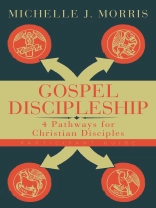There was a time when discipleship was taken for granted. It was assumed that people could be persuaded to believe and that each person would step into the path that took them to Jesus. That assumption is no longer valid. As early as the Gospels, Jesus and his biographers recognize that each person brings experience to the journey, which travels through different times and places. The discipleship path for each individual disciple is assessed and determined through this Gospel Discipleship Participant Guide while the Gospel Discipleship Congregation Guide serves as the implementation guide for church leaders. It also assesses the discipleship path for the congregation as a whole.
By understanding what type of disciple you are, participants in Gospel Discipleship can clarify the path they need to walk. Some people love to go on mission trips; some people really thrive learning from a great teacher; some people connect to God through painting and music; and some people just want to have a cup of coffee and talk about life and eventually get around to talking about Jesus. Participants in Gospel Discipleship can be set free from the guilt of not feeling like a ‘real’ disciple because they don’t feel called to experience the journey the same way as everyone else. Instead, participants can become the disciple Jesus wants them to be. They can spend their valuable time and energy living and walking on the path where Jesus is calling them to follow.
About the author
Michelle Morris is associate pastor of First United Methodist Church, Conway, Arkansas. Previously she was Lead Equipper for the United Methodist Arkansas Conference Center for Vitality, as well as serving as pastor to United Methodist churches in West Memphis and Fort Smith. She has a B.A. in English and French and an M.A. in Comparative Literature from the University of Arkansas. She graduated with her M.Div. from Perkins School of Theology in 2009 and her Ph.D. from the Graduate Program in Religious Studies at Southern Methodist University in 2014. She also graduated with a certificate in Women’s and Gender Studies. Her dissertation examined the subject of infertility in the New Testament. She was a contributor to the CEB Womens Bible, and she periodically writes for the Adult Bible Studies Curriculum for Abingdon/Cokesbury.Michelle and her husband, Travis, have a son, Soren (not named for Kierkegaard).







![Cover of Brian Schrag & Julisa Rowe: Community Arts for God's Purposes [Chinese] 貼近神心意的社群藝術 Cover of Brian Schrag & Julisa Rowe: Community Arts for God's Purposes [Chinese] 貼近神心意的社群藝術](https://static.worldofdigitals.com/thumb_webp/740/9781645083740.webp)




